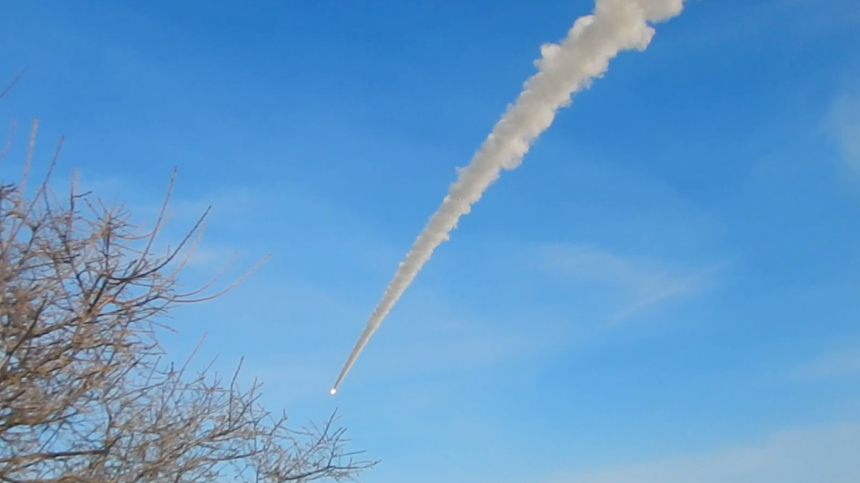Escalating Tensions: Russia's Stark Warnings to the UK
Russia has issued direct warnings to the United Kingdom, signaling a spike in tensions. The Russian Foreign Ministry's statements suggest serious repercussions should UK-supplied weapons be used by Ukraine against Russian territories.
Published May 07, 2024 - 00:05am

Image recovered from 5-tv.ru
Recent declarations from the Russian Foreign Ministry have unequivocally warned the United Kingdom of potential targeted strikes on British military assets, should long-range British weapons supplied to Ukraine be used against Russian territories. This stern warning comes amid escalating tensions and a complex web of international diplomacy, with potential ramifications stretching far beyond Ukraine's borders.
Russia's stance was made clear following provocative statements from British officials, notably former Foreign Minister David Cameron, supporting Ukraine's right to strike using British-supplied arms. Immediate responses from Moscow ensued, with Russia's Foreign Ministry publicly condemning the rhetoric and summoning the UK ambassador, Nigel Casey, to heed the inevitable 'catastrophic consequences' of such aggressive actions by London.
In a related development, Russia's defense ministry announced battlefield nuclear weapons drills as a direct response to Western leaders' 'provocative statements and threats.' Such drills emphasize Russia's preparedness to exercise what it describes as its sovereign right to safeguard territorial integrity, sustaining the capability to use non-strategic nuclear weapons in conflict.
The confrontation has reached a new zenith with Russia explicitly stating that any British military facilities and technology within Ukraine—and possibly elsewhere—could be subjected to retaliatory attacks if Ukrainian forces target Russian territory with British weaponry. This rhetoric has been accompanied by allegations of 'nuclear blackmail' and de facto involvement of the UK in the Ukraine conflict as assessed by the Russian side.
The gravity of the situation is underscored by reported Ukrainian drone strikes on the village of Beriozovka in Russia's Belgorod region, leading to civilian casualties, further intensifying the strife and highlighting the profound implications of the conflict spilling over the territorial confines of Ukraine.
The sharp escalation in rhetoric comes as the conflict, which began in 2014, has deeply worsened following Russia's full-scale invasion of Ukraine in February 2022. With Western nations, notably the United Kingdom, the United States, and other NATO members, providing varying degrees of military assistance to Ukraine, the Kremlin has repeatedly expressed its view that such actions represent direct interference in the conflict and could lead to broader confrontations.
The UK's position on the matter, as delineated by current Foreign Secretary Liz Truss, reaffirms the UK's commitment to supporting Ukraine's self-defense efforts, including the provision of defensive weapons systems. Truss has emphasized that the UK, in unity with its allies, holds a steadfast approach towards countering what is perceived as unjust aggression by Russian forces against Ukrainian sovereignty.
Despite these tensions, diplomatic channels remain ostensibly open. However, the tone of communications suggests that the gap between Russia's demands for security guarantees and the West's support for Ukraine is widening. This gulf was apparent in the recent G7 Foreign Ministers meeting where a joint statement gave assurances of continued support for Ukraine, further irking Moscow.
In light of these international developments, experts fear an exacerbation of the confrontation could disrupt global security and economics. The potential for spill-over effects, such as impacts on energy supplies, disruptions to the global food market (owing to Ukraine's significant role as a grain exporter), and the implications for international law and order cannot be overstated.
Within the UK, the government is facing pressure to calibrate its support for Ukraine against the growing risk of Russian retribution. The domestic debate now includes concerns over the UK's readiness to handle any potential fallout. As UK defence capabilities are evaluated, questions arise about the sustainability of the current level of military aid to Ukraine and the broader long-term strategy for dealing with Russia.
Aware of the gravity, NATO has called for restraint and de-escalation from all parties involved. The alliance stresses the importance of diplomatic efforts while continuing to affirm its collective defense principle. However, with NATO member countries significantly involved in the crisis, the risk of an inadvertent escalation cannot be dismissed.
As global leaders grapple with the situation, the international community watches with bated breath. The outcome of these fraught interactions between the UK, its allies, and Russia could set the trajectory for international relations and regional stability for years to come. The coming days are likely to be a critical juncture in diplomacy, with hopes that tension can be eased without further military escalation.
Ultimately, the world is witnessing a high-stakes geopolitical drama unfold, where the actions and decisions of a few could impact the lives and welfare of many across the globe. It remains to be seen whether the sobering reality of mutual destruction will guide the hands of those at the helm towards a peaceful resolution or if a graver historic episode is set to be written.






